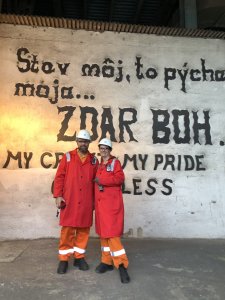This summer, Katarína Kurucová joined the top management of Komerční banka as head of corporate and investment banking. A highly energetic woman, she is one of the leaders in the banking business, and it was precisely in the field of corporate banking that she managed to win clients’ trust in Slovakia. In less than fourteen years, she more than tripled the commercial balance sheet of KB’s Bratislava branch, which she headed. “In Slovakia, we were a small bank with a narrow product focus on large companies. Therefore our ambition, which we fully achieved, was to be a good number two for them. Komerční banka is of course in a completely different league in the Czech Republic. I would like us to bring it back to the top, so that it can once again be the first lady of Czech business,” she begins our interview with this wish.
What we direct our energy towards grows
The time when Komerční banka was number one in corporate banking in the Czech Republic is not so long ago. Why do you think it lost that position? And what is your vision for returning it to the top?
I would say that KB earned and deserved its position as the number one corporate bank, and in certain business circles, it still holds it. However, its position in this regard has weakened over the past few years. Why did this happen? The bank has been going through a complex transformation internally, with major changes in organizational structure, large investments in new technologies, digitalization in the retail segment. During such a demanding transformation, every organization redirects its energy to make the changes efficient and fast, and monitors their implementation and the resulting effect. It is natural that energy is directed towards what is being transformed. For those parts of the organization that are not affected by the process, it’s assumed that they will continue to operate at standard performance.
Unfortunately, that only works for a limited time. And so it happened that we did not fully capture the moment when our corporate division was at its peak and still running on autopilot. In the meantime, the lack of energy began to show, and other banks naturally seized the opportunity and took a slice of our pie.
Can you quantify how much of the bank’s revenue is now made up of corporate clients?
The figure is forty percent, which is not a small amount at all. Moreover, after just a few months in this position, I can see that our bank has some form of interaction with at least half of the companies in this country. We are not the main bank everywhere, but we provide some service there – and that’s amazing! If we can redirect energy back into this area, it is very realistic to develop, evaluate and transform this base into growth.
Komerční banka has some form of business relationship with at least half of the companies in the Czech Republic.
Simply put, I see my main task as changing the mindset and resetting the perception of corporate clients’ importance within KB, which of course requires patient dialogue with our parent company, Société Générale. The huge transformation that KB is implementing and that is now in its final stage in retail segments must not take away our strength, desire, motivation and spark for building our position in corporate banking.
Quality, price and human approach
Do you have a formula for how to make clients choose Komerční banka? What do you think is most important for company leaders in this regard – quality, price or personal human approach?
You’ve listed it perfectly. In my opinion, it’s all these three things. None of them works without the others, and you have to offer them all at once. In Slovakia, people knew that our services weren’t the most modern, but we were able to listen to clients and offer added value. And we didn’t abandon them when they made mistakes, because that can happen too. They trusted us.
A corporate client is a demanding client. They expect high quality at a reasonable price. The personal approach of a banking advisor is the cherry on top. If quality and price are in the right balance, the provider comes in. Their added value is closeness to the client, understanding their specifics, open communication and fast approval process. The relationship should be very partnership-based. The larger the company, the more this applies. Being able to listen with understanding and a certain degree of humility towards clients’ wishes is crucial, particularly in such a transformative period as the one we live in.
In Slovakia, your vision was fully realized. What are you betting on in the Czech Republic?
I’ve already mentioned some things, but I’d like to emphasize that I’m relying above all on my colleagues, whom I’ve already come to know as a team of highly committed professionals. They want to do corporate business, deliver solutions to clients and they know how to listen to them. They have what it takes to outperform the competition and they haven’t lost the desire to compete with them. In my view, that’s our strongest card. My role is to earn their trust and build a cohesive team. For example, by making their work with clients easier through internal simplification of processes and better mutual understanding between our HQ in Paris and Prague. Because the largest deals with major corporations are approved abroad, and we need to understand each other perfectly.
The story of KB in Slovakia and the Czech Republic is different. However, client trust remains the alpha and omega
A few months ago, you left a very successful KB branch in Slovakia, which you and your team had been building for fourteen years. What lessons from that business can you apply here?
Right at the beginning, it’s important to say that the story of KB in Slovakia and in the Czech Republic is very different. The Slovak KB did not have a good reputation in the first decade of this century. That was partly due to the financial crisis, but also because it was a relatively small bank with a small number of clients in both retail and corporate sectors. The bank was therefore trying to do everything, so it was a bit faltering in the market. Therefore in 2010 came a decision to transform it into a bank with a narrow focus on corporate clients – larger companies. A painful period of branch closures and layoffs followed. I joined in 2011, and at that time we had a loan portfolio of €300 million. By the time I left, it exceeded €1 billion. All that with a small team of forty-five employees, which operated like a family business. KB in the Czech Republic, on the other hand, is a large corporation with an enormous product range and thousands of employees. So the internal communication methods and the scale of the agenda are vastly different.

“In Slovakia, I spent most of my time as a corporate banker. I had the chance to get to know so many different companies and industries, which was a wonderful experience I might never have had elsewhere. And I believe that I will get to know Czech companies just as well,” says Katarína Kurucová. Pictured with Jan Juchelka, current Chairman of the Board of Directors and CEO of KB, at Košice steelworks, owned by the American company U.S. Steel.
Still, I believe many experiences are transferable. Slovakia and the Czech Republic are very interconnected markets, so some corporate clients cooperate with Komerční banka in both countries. For certain clients, it may also an advantage that we are the only bank in the market with a French parent company. But the main lesson I brought with me is setting the approach to clients – the fact that we need to convince them in both countries that partnership with KB makes sense and that they can trust us.
Being able to listen to corporate clients with understanding and a certain degree of humility towards their wishes – that must be our main added value.
How has the Czech business environment impressed you so far?
Extremely positively! I see a functioning economy and a very strong business community that includes large enterprises as well as a rich base of medium-sized and smaller family-owned businesses spread across the country. I also notice a steady inflow of foreign investment. I see this in contrast to Slovakia, where the situation is much more difficult. And it saddens me that what I see – your achievements, the beauty and safety of your country – you often don’t see. I often hear only criticism. I think that if you could look at things with a greater perspective, you could take pride and joy in everything you have built, because you are a hardworking and creative nation.
I look forward to delving into the Czech corporate environment and having the opportunity together with my team to convince your industrial leaders that Komerční banka is a partner they can trust. And that it will be their first choice once again.
Katarína Kurucová was interviewed by Jana Jenšíková
Photo credits: Komerční banka



